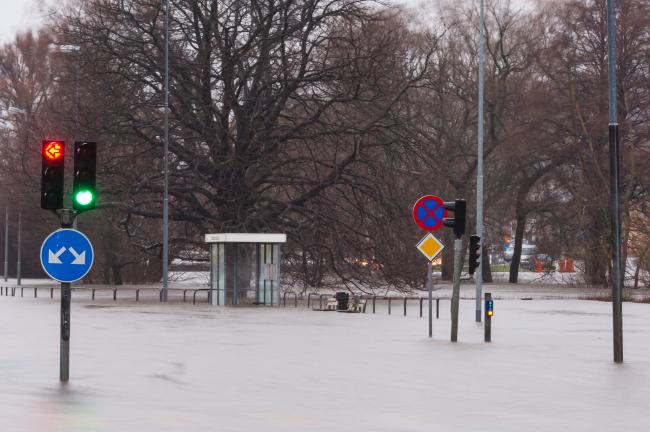#Flood #Risk #Sweden, 8-9 October 2025
Welcome to this joint conference that brings together experts to deepen our understanding of dynamic flood hazards, exposure, vulnerability, and adaptation strategies. This event serves as a platform for interdisciplinary collaboration, where we share innovative methodologies and explore how data-driven research can enhance decision-making in flood risk management across Sweden. Join us as we explore the intersection of research and practice to build a more flood-resilient future.

The conference is organized by four research projects, SPARC, DRASTIC, Delfi and FIER, and includes perspectives from members of the Centre of Natural Hazards and Disaster Science, CNDS.
Registration now open
Registration closed on September 30.
Program
Presentations will be held in Swedish where not stated otherwise.
Place: Karlstad University
Wednesday, October 8
11.45–13.00 Registration
12.00–12.45 Lunch, Transformum (1A 307)
13.00–13:15 Opening of Conference: Rolf Larsson, Water Resources Engineering, Lund University, Frödingsalen (1B 364)
13.15–13.45 Keynote: Digitalization in a Pressured System – Meeting Future Demands with Fewer Margins: Glen Nivert, Strategist, Kretslopp och vatten, City of Gothenburg
As climate adaptation, flood risks, and stormwater management grow more urgent, municipalities will expected to do more with less. With shrinking resources and increasing demands, how can we deliver sustainable water management that’s both efficient and resilient?
This keynote explores how digitalization – through tools like digital twins, AI, and data collaboration – can help prioritize, optimize, and transform how we work. Drawing from Gothenburg’s experience, Glen Nivert discusses not just the potential of technology, but the organizational changes required to succeed when the margins for error are getting smaller.
13:45–14:00 Ongoing Work on Karlstad’s Climate Adaptation Plan – Updated Vulnerability Analyses and Flood Risk Mapping within the Municipality: Kristina Hedfors, Stormwater Coordinator, and Malin Hedlund, Flood Risk Coordinator, Karlstad Municipality
14.00–14.15 Climate Adaptation and Cloudburst Management in Trelleborg: Lessons Learned from SPARC: Shifteh Mobini, Water and Wastewater Utility, Trelleborg Municipality
14.15–14.30 The Klarälven River and High Flows Over 40 Years – Which Events Have Had the Greatest Impact, and What Challenges Lie Ahead? Malin Jonsson, Head of Environment and Construction, and Sara Johansson, Urban Planner, Torsby Municipality
14.30–15.00 Fika (Coffee break)
Session 1: Data Crowdsourcing & Private Meteorological Stations
15.00–15.15 Evaluation and Application of Citizen-Operated Rain Gauges in Sweden: Jonas Olsson, Hydrologi research, SMHI, Water Resources Engineering, Lund University
15.15–15.30 Private Rain Gauges for Professional Use: Testing the Netatmo Rain Sensor in Trelleborg and Svedala: Tomas Wolf, Water and Wastewater Utility, Trelleborg Municipality, and Rolf Larsson, Water Resources Engineering, Lund University
15.30–15.45 Evaluating Private Rain Gauge Data to Evaluate an Extreme Rainfall Event in Båstad, 2022: Jonas Olsson, Hydrologi research, SMHI, Water Resources Engineering, Lund University
15.45–16.00 Motivations and barriers for citizens when sharing weather data on the Internet: Louise Petersson Wårdh, SMHI, Water Resources Engineering, Lund University (presentation in English)
Session 2: Hazard Modelling (presentations in English)
16.00–16.15 Assessing the spatial extent of flooding in Sweden using a dynamic flood hazard modelling: Yeshewatesfa Hundecha, SMHI
16.15–16.30 Improving Flood Preparedness through Enhanced Exposure Assessment: A Comparison of Static and Dynamic Approaches: Konstantinos Karagiorgos, Risk and Environmental Studies and Centre for Societal Risk Research, Karlstad University, Centre of Natural Hazards and Disaster Science (CNDS), Uppsala
16.30–16.45 A topological characterization of flooding impacts: Insights from Karlstad municipality: Nikos Kavallaris, Mathematics and Risk and Environmental Studies, Karlstad University
16.45–17.00 Exploring the impact of sewer system on pluvial flooding: How Trelleborg's sewers handle heavy Rain: Shifteh Mobini, Water Resources Engineering, Lund University, Water and Wastewater Utility, Trelleborg Municipality
19.00 Conference Dinner at Hotel Scandic Winn, Norra Strandgatan 9-11, Karlstad
Thursday, October 9
Session 3: Vulnerability analysis & adaptation measures
08.30–08.45 Expert-Based Risk Assessment of Cloudburst Damage to Single-family houses in Sweden: Barbara Blumenthal, Centre for Societal Risk Research, Karlstad University
08.45–09.00 Mapping Municipal Flood Risk in Sweden by 2050: A Composite Indicator Approach Using EWM-TOPSIS for Climate-Informed Adaptation Planning: Shashwat Sinha, Department of Built Environment and Energy Technology, Linnaeus University (presentation in English)
09.00–09.15 Evaluation of Blue-Green Stormwater Parks in Sweden: Sofia Hallerbäck, Risk and Environmental Studies and Centre for Societal Risk Research, Karlstad University
09.15–09.30 Nature-Based Flood Management in the Nissan River Basin – Emerging Concepts and Governance Structures: Jens Portinson Hylander, VTI - Swedish National Road and Transport Research Institute
09.30–10.00 Fika (Coffee break)
10.00–10.30 Discussion: What’s Next? Ideas, Opportunities and Collaboration
Session 4: Stakeholder engagement & governance
10.30–10.45 Barriers and drivers for cloudburst risk management in Swedish municipalities: Lars Nyberg, Risk and Environmental Studies and Centre for Societal Risk Research, Karlstad University, Centre of Natural Hazards and Disaster Science (CNDS), Uppsala
10.45–11.00 Simulated Collaboration: RiskLab as a Tool for Exploring Flood Risks and Decision-Making: Emelie Hindersson, RiskLab, Risk and Environmental Studies and Centre for Societal Risk Research, Karlstad University
11.00–11.15 Weather - that´s what shapes our lives. An Interview Study on Conducting, Documenting, and Sharing Weather Observations: Peter Bellström, Information systems, Karlstad University, and Lars Nyberg, Risk and Environmental Studies and Centre for Societal Risk Research, Karlstad University, Centre of Natural Hazards and Disaster Science (CNDS), Uppsala
11.15–11.30 Building Competence and Capacities for Managing Multi-Hazard Risks in a Cross-Border Context: The Potential of the Serious Game “Collaborate or Collapse”: David Olsson, Centre for Societal Risk Resarch, Karlstad University, and Ala Sarah Alaqra, Information systems, Karlstad University
11.30–12.00 Summary and the Way Forward: Lars Nyberg, Risk and Environmental Studies and Centre for Societal Risk Research, Karlstad University, Centre of Natural Hazards and Disaster Science (CNDS), Uppsala
12.00–13.00 Closing lunch, Transformum (1A 307), eat in or take out

